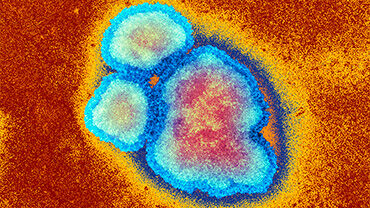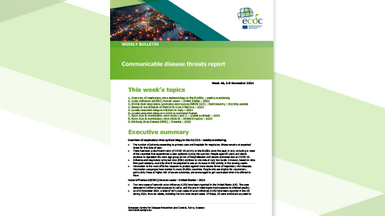High vaccination coverage key against expected increase of measles cases in the EU/EEA
Measles cases are expected to continue increasing in the EU/EEA in the coming months due to sub-optimal vaccination coverage for measles-containing vaccines (MCV) in a number of EU/EEA countries, the high probability of importation from areas experiencing high circulation and the fact that the coming months represent the seasonal peak of the virus.
The evaluation is included in a recent ECDC assessment: Measles on the rise in the EU/EEA: Considerations for public health response.
ECDC data shows that in January and early February 2024, the number of EU/EEA countries reporting measles cases has increased. At least seven deaths have been reported from two countries.
Andrea Ammon, ECDC Director said:
“Nobody should die from measles. The increase in cases of measles, a highly contagious, but vaccine-preventable disease, is a stark reminder that all Member States should maximise efforts to achieve and maintain high vaccination coverage for all vaccine-preventable diseases. Vaccines are a safe and effective way to reduce the health burden of infectious diseases and avoid unnecessary loss of life.”
Measles poses a threat to individuals of all age groups, which highlights the importance of maintaining high vaccination coverage across the entire population. The highest potential impact of measles, due to the high morbidity following infection, is for infants too young to be immunised (usually those under the age of 12 months, depending on national schedules). Unvaccinated children under five years old are also at increased risk, as measles can have several complications in this age group. Additionally, other groups such as the immunocompromised are at risk of severe outcomes from measles.
Commissioner for Health and Food Safety, Stella Kyriakides added:
“The rising trend in measles cases across Europe is worrying. This is an extremely contagious disease which can cause serious complications, particularly for children and vulnerable persons. The good news is that it is a disease which is preventable through vaccination and that there are plenty of safe and effective vaccines available in the EU. When we see measles outbreaks, we know there is a gap in vaccinations. I urge everyone to check their vaccination status and parents to make sure their children and young person’s vaccines are up to date. Vaccination protects and saves lives, it is one of our strongest tools against measles and many other infectious diseases.”
Measles spreads very easily, therefore, high vaccination coverage, of 95% or higher of the population vaccinated with two doses of the vaccine, is essential to interrupt transmission in a country or community.
Efforts should be therefore intensified to identify and reach unvaccinated or partially vaccinated populations. Equity in access to immunisation should be ensured, especially for vulnerable populations like migrants, ethnic minorities, and those who live in crowded settings e.g. refugee camps.
High-quality surveillance systems are essential for early detection, response, and control of local measles outbreaks. In addition, enhanced laboratory diagnostic capacity facilitates to track virus genotypes and identify transmission chains.
Raising awareness on the measles situation among health professionals across various specialties is important, to ensure timely diagnosis, especially in older children and adults.
Efforts should be also made to identify the reasons for low vaccine uptake in communities and implement tailored interventions. These include risk communication and community-based initiatives, including towards underserved population groups.
ECDC remains committed to collaborate with EU/EEA countries and international partners to assist countries in increasing vaccination coverage and protect public health.







